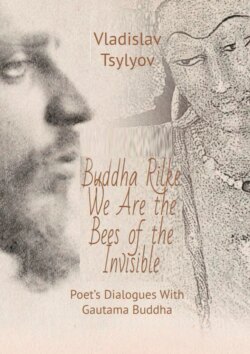Читать книгу Buddha Rilke: «We – are the bees of the Invisible». Poet’s dialogues with Gautama Buddha - - Страница 4
We Are the Bees of the Invisable
ОглавлениеRilke and the Bodhi Tree
́Isn’t it your dream to be invisible?́
Let all then here perform good deeds,
For future weal a treasure store…
– Gautama Buddha
In 1922, at the height of his creative powers, Rilke completed his epochal ́Duino Elegieś and wrote the equally impressive ́Sonnets to Orpheuś (hereafter the Elegies and the Sonnets). After ten years of silence, linked to the events of the First World War and to bouts of severe depression that periodically overwhelmed the poet, Rilke finally presented to the world the result of his long and intense spiritual quest – two undoubted masterpieces, two outstanding cycles of poetry, each of which can rightly be considered one of the greatest poetic revelations of the twentieth century.
If we talk about the peculiarities of the Elegies, they are characterised, first of all, by the innovative metaphysics of the universe and the human soul, by the authoŕs original ́decodinǵ of the symbolism of angels and salvation. For this reason, the understanding of the Elegies, which did not fit in with the usual Christian ideas, caused (and still causes) considerable difficulties for translators and philosophers.
In his letter to the Polish translator Witold von Gulewicz (hereafter the Letter), who had asked the poet for clarification, Rilke outlined a concise yet impressive interpretation of his Elegies – perhaps the best available today. To do this, he had to write a new artistic work within the epistolary genre – a small essay which, together with the Elegies and the Sonnets, formed a unique and inseparable artistic whole – a lyrical and philosophical triad. At the very beginning of the letter, however, Rilke stated that the true meaning of the Elegies was still inscrutable to him, for the Elegies were infinitely beyond his understanding.
The imaginary dialogues between the poet and the Buddha offered to the reader in this etude may seem like yet another attempt to interpret the Elegies. However, the main point in this dialogue (as in all the others) is not to achieve an ́understandinǵ of Rilke’s lyrical revelations, but to search for the ́unprecedented unitý of the views of the poet and the Buddha, who do not try to justify or prove anything to each other. For the knowledge that each of them possesses is universal in nature and needs no explanation: it lies in the incomprehensible, beyond words and concepts.
Nevertheless, in order to be better prepared to read the Dialogues, it is worth knowing a little more about the three essential elements of the poetic cosmos of the Elegies:
Man, Angels and the Invisible.
• The Invisible
Only through ignorance and delusion do men indulge in the dream that their souls are separate and self-existent entities.
– Gautama Buddha
First of all, in attempting to answer the eternal question of the primary basis of human existence in his Elegies, Rilke introduces a very important and difficult to understand category into his philosophical vocabulary – the Invisible (́Unsichtbareś). This word will certainly mislead the reader who is not familiar with the texts of the Letters and the Elegies. Indeed, at first glance, based only on the meaning of the word itself, it may seem that it denotes only a relative, limited category, referring to something otherworldly, non-existent, which can be contrasted with something visible, existing. In other words, the Invisible belongs to the world of opposites known as Samsara*. However, as we shall see from the text of the Letter, the author of the Elegies endowed the Invisible with much more meaning, going beyond the usual notions of life and death, of the earthly and the hereafter. According to Rilke, the Invisible is ́a vast unitý, ́a true lifé, a supreme existence that encompasses ́this world and the otheŕ. The Invisible is absolutely real. Naturally, the Invisible is also present in the Sonnets. The poet even invented a special word for this category – ́Doppelbereich́ (́double realḿ, ́both this light and the otheŕ).
Rilke and Bodhisatta Vajrapani
At this point the reader is bound to ask, ́Is it possible to find something like the Invisible in the Buddhist lexicon?́ Of course it is, given the powerful conceptual apparatus developed in the Buddhist tradition. Without pretending to make a definitive choice, we can assume that Rilke’s Invisible, his ́Doppelbereich́, is nothing less than the abode of eternal and unchanging… Truth. And that by gathering ́the honey of the visible in the beehive of the Invisiblé, the Rilkean man penetrates the abode of Truth and becomes Truth himself.
To illustrate how close the views of the author of the Elegies on the Invisible are to Buddha’s Teaching on Truth, we can quote Rilke’s words that not only man but also the earth has no other destiny than to become invisible:
́The earth has no other way out but to become
invisiblé.
Isn’t this also what Gautama preached when he claimed,
́Truth is the accomplishment and goal of all existencé?
• Man Who Participates in the Invisible
…there is no being that cannot be transformed into a vessel of Truth.
